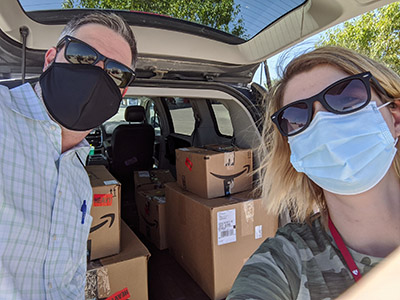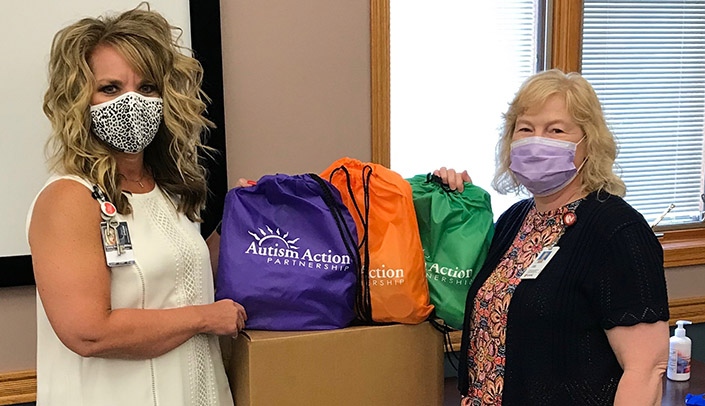The Munroe-Meyer Institute is one of the community partners joining forces with Autism Action Partnership (AAP) to provide COVID-19 activity kits for children with autism throughout Nebraska.
The kits were funded by AAP supporters. Created with input from local and national experts, they contain materials to provide fun and therapeutic activities for parents and children, as well as links to activity modeling videos and additional online resources.
 |
From left, Autism Action Partnership Executive Director Justin Dougherty meets with Megan Kleensang, MMI’s Columbus-based parent resource coordinator, to deliver kits to her. |
The kits were created as a direct response to the pandemic, said AAP Executive Director Justin Dougherty, as many families have reported that, cut off from the supports of schools, their children with autism have seen increased challenges.
“More than 600 of these kits have gone out our doors,” Dougherty said. “The biggest portion of them have gone to partners like MMI across the state who are acting as hubs for others to receive them. More than 400 are now in the hands of Nebraska families, and that number increases every day.”
With its network of services across the state, MMI was a perfect partner for the effort, he said.
“We’ve had a longstanding partnership with MMI, and we have great respect for them and what they do,” he said. “MMI’s parent resource coordinators serve a unique and valuable role to the families we work with. We knew if we could get the kits to them, they would act as a superhighway to get them to the families who need them.”
Candi Koenig, a PRC based in Kearney, said MMI professionals had recognized the challenges caused for families when access to schools and services became limited in the spring and summer.
“We saw that children with autism were regressing in terms of their social behaviors and skills,” she said. “AAP’s kits are filled with sensory materials to help kids get focused and activities families can do together.”
Koenig originally asked Dougherty for 25 kits to share directly with families in the Kearney area. However, as AAP continued to receive requests from additional partners, she agreed to accept 300 kits and distribute them to community partners in the Kearney and Holdrege areas. PRCs in Lincoln, Columbus/Norfolk and Omaha also have received kits to distribute.
“This is a true example of community partnership and how we leverage resources and work together to make sure children with intellectual and developmental disabilities and their families across the state get the resources they need,” said Sarah Swanson, assistant professor and program manager of the PRC program at MMI.
Sarah Kuhl is the co-owner of The Spectrum Center for Autism in Kearney, one of the longtime community partners where Koenig helped AAP deliver kits so they could be shared with client families.
“The response has been great,” Kuhl said. “Several of our parents can’t believe how much is in the kit — they’re surprised at the amount of materials.
Kuhl said the kits have proven popular, especially since families have been telling her since March that the lack of structured activity has been difficult for their children.
“These kits are wonderful,” she said.
Dougherty said AAP initially piloted the idea with 300 families, and the response was so positive that AAP supporters, including the board of directors, were enthusiastic about expanding the effort.
“Parents across the country and the world during this pandemic have been asked to be their children’s teacher — everyone understands that,” he said. “Families with school-age children who have disabilities (like autism) are asked not only to be teachers but speech therapists, behavioral specialists, occupational therapists, physical therapists — all these services to which they now have only limited access or have completely lost access. And even if they can access services online, they might not have supplies and tools at house, especially in rural Nebraska, to work with their children.
“These kits are designed to help address that.”
Dougherty stressed that the kits are a community effort, with support from community partners such as MMI, Boystown, Nebraska Educational Service Units (ESUs), businesses such as Werner Enterprises, and many volunteers.
“This is an example of the type of community we have and the solidarity and unity within the autism community across the state of Nebraska,” he said.
